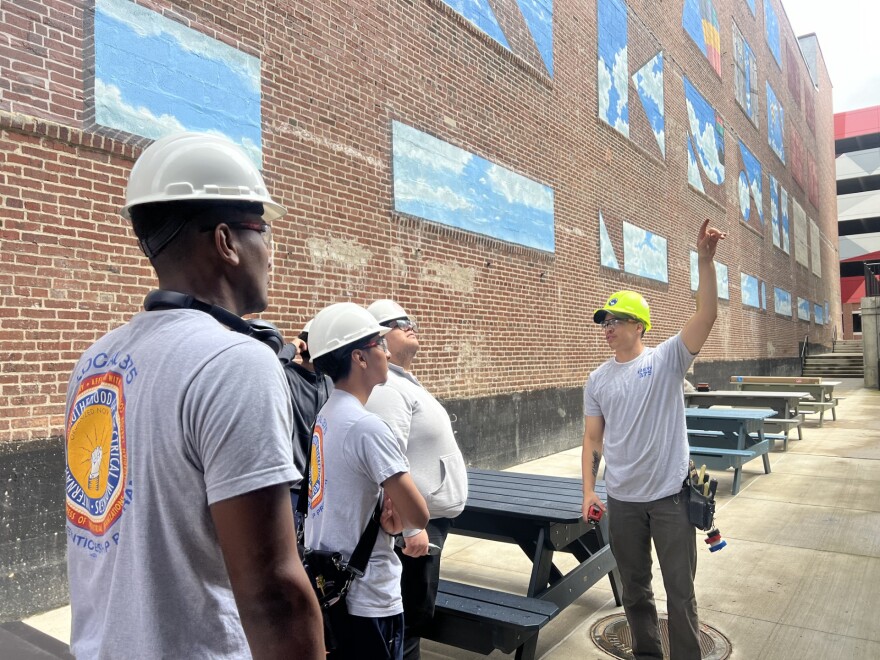ALLENTOWN, Pa. — Melody Rodriguez has never been interested in an office job. She’d rather be on the move.
That’s what she likes about electrical work — it’s hands-on and keeps her busy.
“It’s stuff I like, so I’m learning it, and I’m getting happy, excited,” said Rodriguez, a recent Dieruff High School grad.
Over the past 14 weeks, Rodriguez and a dozen other Lehigh Valley teens have participated in a new pre-apprenticeship program at the International Brotherhood of Electrical Workers Local Union 375 in Allentown.
The program, which was funded through a state grant, exposes Allentown high school students to the skills necessary to become an electrician.
The first iteration of the program officially wrapped up this week, but some teens will continue coming to the union hall at 101 S. Seventh St. to keep learning. In coming weeks, they’ll receive training to be certified in first aid and CPR. They’ll also practice their algebra in preparation for an upcoming math and reading test later this month – a necessary step to be considered for admission to the union’s five-year apprenticeship program to become a journeyman electrician.
“The whole point of the pre-apprenticeship is to see if the kids actually want to do construction and get them in it,” said Rob Franklin, the IBEW’s training and safety director.

Student participants in the new feeder program came from Dieruff, Allen High School, Building 21, Roberto Clemente Charter School and Executive Education Academy Charter School. They were all seniors who graduated earlier this month. Some will go to college while others will pursue entry into the IBEW’s apprenticeship program, which begins classes again in September.
Through the 40-hour pre-apprenticeship program, the students learned electrical skills, such as basic wiring and splicing techniques, as well as life skills, like personal responsibility and time management.
“They want to make sure we get every aspect of it — the safety part, the working together part, the working alone, how you’re going to make mistakes, and actually getting things done right — all of that.”Melody Rodriguez, recent Dieruff High School graduate
“They want to make sure we get every aspect of it — the safety part, the working together part, the working alone, how you’re going to make mistakes, and actually getting things done right — all of that,” Rodriguez said of the program.
Students also earned their OSHA-10 credential from the Occupational Safety and Health Administration of the U.S. Department of Labor. This certification prepares them for common safety and health hazards on the job.
By completing the pre-apprenticeship program and earning their OSHA-10 credential, the students fulfilled their state graduation requirements under Act 158. Completion of a pre-apprenticeship program is one pathway to graduation instead of standardized testing.
Learning electrical skills
In addition to safety training and classwork, pre-apprenticeship students also practiced hands-on skills and learned how to use tools, including a screwdriver, wire cutters, pliers, a tape measure and a level. They received a free pouch of tools to keep.
At the union’s training center, the students installed single pole switches and lights, as well as outlets and receptacles.
“When it works and you see the light, it’s really nice,” said Jaden Gomez, a recent Allen grad.
Students practiced reading blueprints and bending conduit, the protective tubing that holds electrical wires. They also learned about three-way switches, which allow a light to be turned on and off from two separate locations.

Because of the program, Davian Samol, a recent Allen grad, realized he has a three-way switch in his home.
“I never knew how to work it, but now I do,” he said.
The pre-apprenticeship cohort also spent time working on an electrical project in downtown Allentown for the City Center Group. They helped install conduit and wires at the 932 Hamilton Pathway that connects the Walnut Street garage to the Archer Music Hall that's being built. The electrical system will provide power to vendors and artists who set up in the walkway at future events.
“It gives them a little more sense of accomplishment that you’re not just building something to tear it out,” Franklin said. “Now, you’re actually building something that’s going to stay and people are going to use.”
The experience also gave students a taste of what it’s like to be on a job site as an electrician to help them decide if they want to pursue the career.

A career as an electrician
One goal of the feeder program is to attract underrepresented groups to the trades, such as students of color from inner city communities, Franklin said. It gives them an option besides college or the military.
Apprentices start out earning $16.50 an hour to work on job sites while in the program and attending school, which does not cost any tuition.
It gives them a little more sense of accomplishment that you’re not just building something to tear it out. Now, you’re actually building something that’s going to stay and people are going to use.Rob Franklin, IBEW training and safety director
To be admitted to the apprenticeship, students must apply, pass a math and reading test, and complete an interview. About 300 people applied for the 2023-24 first-year class and only 22 were accepted. For the 2024-25 class, the union received more than 400 applications.
Franklin said about 10% of the union’s current 108 apprentices are Allentown School District graduates. But they didn’t join the apprenticeship until their late 20s, he said. About half of all applicants who apply to the apprenticeship do so after earning a college degree.
“I think there’s a renewed interest [in the trades] because of what the cost of college is,” Franklin said, adding a degree doesn't always provide a monetary return on the investment of tuition.

The pre-apprenticeship program offers students the chance to learn about the trades and their high-earning potential early on. A union journeyman earns a salary of about $90,000 in their first year as an electrician, Franklin said.
Laque Oliver, a pre-apprenticeship instructor and journeyman, said anyone can learn to be an electrician if they commit to working hard enough, and that’s what he told students — everything else you can learn on a job site.
“Definitely work ethic would be the one and only thing,” he said.
The pre-apprenticeship will continue through at least the 2025-26 school year thanks to grant funding. But Franklin said the union may decide to continue funding the program if it’s successful.
Allentown high school seniors will participate in the next pre-apprenticeship cohort in the fall. Juniors will be allowed to join in spring 2025.


